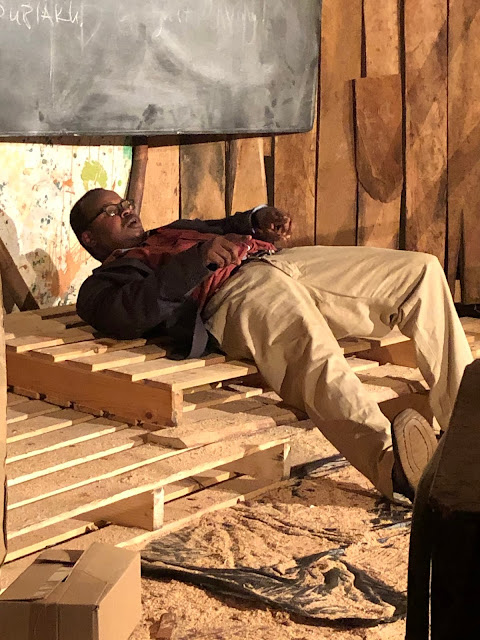By
Margaretta wa Gacheru (posted 18 September 2019)
Dr Fred Mbogo
morphed magnificently into any one of several crazed men in ‘A Revolution Ate
my Son’, the script that he wrote and staged last weekend at Kenya Cultural
Centre’s Cheche Gallery under Esther Kamba’s direction.
I am not really
the right person to appraise his performance since I was unable to see the whole
of his sterling one-man show.
Nonetheless,
in the final third of the play which I managed to see I witnessed the insidious
influence of that genre of drama known as the ‘theatre of the absurd’ on the
playwright-actor who is also a university lecturer in the theatre arts. It was apparent
in Mbogo’s showcasing of the insanity of contemporary African history.
Eventually the
man flees the country and arrives in the land where the streets are supposedly
paved with gold, the USA. But Karumba’s life in exile isn’t pretty or
purposeful, apart from his making money doing menial labor, drinking a lot and
having sex with heaps of white women.
His
womanizing stops abruptly after meeting one vindictive woman who’d gotten fed
up with her abusive spouse. Having chopped off her man’s head, she proudly
shows it like a trophy to Karumba who quickly flees for his life and decides to
head back home after many years away.
What had
actually led Karumba to flee his country in the first place was fear. He had
seen the senseless shooting of the harmless old man, Baba Ogumu and realized he
could easily be next since he’d already been senselessly grabbed once.
The Baba’s
only ‘crime’ was asking questions. Maddened by his inability to find his son, he
roamed the streets asking if anyone knew where he could find his son. In fact,
Baba Ogumu is the one who, if he’d been lucid, would have spouted the story’s
title, ‘A Revolution Ate my Son.’ For Ogumu had actually been part of the
so-called ‘second liberation’ struggle aimed at overthrowing the wicked head of
state.
Karumba is
no hero despite being qualified to be called an ‘exile’. Once he returns home,
he is accurately perceived by many members of the struggle as a traitor who
deserves no adulation for having sought refuge and ‘the good life’ overseas.
But Karumba
still hopes to reunite with the fiancée he had left behind. That doesn’t happen.
Thus, what we are left with is a cynical portrait of a coward whose life in
exile served no purpose despite the mythologies that revolve around those who
flee into exile supposedly to save their lives and to eventually fight another
day.
Mbogo’s
cynical portrait of an exile was challenged during a question and answer
session following the final night of the play. One audience member asked him
why he had portrayed such a serious topic in such a comical way. Mbogo didn’t
quite give a clear answer except to say it was the style he’d chosen.
In fact, he
explained that his script was modeled after a novel by Mukoma wa Ngugi entitled
‘Mrs Shaw’. Mukoma was meant to arrive in Kenya for an ‘Artistic Encounters’
session at the Goethe Institute to be interviewed by Mbogo and Zuki Wanner.
However, that program had been scuttled when Mukoma, a lecturer in Literature
at Columbia University in the US, was not able to come to Kenya as planned.
“So I decided,
since I had prepared myself for that interview, to make something out of Mukoma’s
story,” says the playwright who has written more than fifty plays since secondary
school.
It is
unavoidable to note that the novelist Mukoma is himself the son of an exile.
Ngugi wa Thiong’o has often been faulted for living in exile while Kenya’s
problems remain and the ‘revolution’ has yet to be won.
But Mbogo is
the first to dispel any notion that Mukoma was writing about his father. There
are mixed opinions about the author’s intentions, but since Mukoma never showed,
the speculation will continue. The cynicism left untamed.





No comments:
Post a Comment